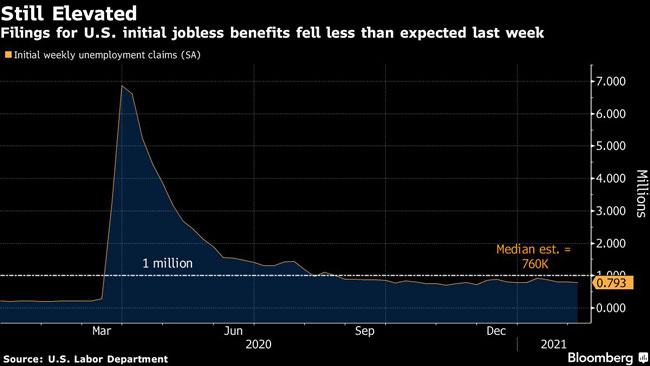US State Jobless Claims Ease While Federal Programs Swell

[Ensure you have all the info you need in these unprecedented times. Subscribe now.]
Applications for U.S. state unemployment insurance fell slightly last week while claims for federal benefits swelled, illustrating the persistent challenges in the system of delivering financial aid to the nation’s jobless.
Initial jobless claims in regular state programs decreased by 19,000 to 793,000 in the week ended Feb. 6, after an upward revision to the prior period, Labor Department data showed Feb. 11. On an unadjusted basis, claims fell by 36,534 to 813,145. Economists in a Bloomberg News survey estimated 760,000 initial claims.
Figures for Pandemic Unemployment Assistance, a program for self-employed and gig workers, rose by 1.5 million to 8.7 million on an unadjusted basis in the week ended Jan. 23. In the same period, there were 4.8 million continuing claims for Pandemic Emergency Unemployment Compensation, which provides extended jobless benefits for those who have exhausted their regular state benefits.

The increases in federal benefit programs come after states retooled their systems following the extension of these programs by Congress at the end of last year. While the labor market recovery remains bumpy, job growth should improve as the number of COVID-19 cases decline, businesses reopen and vaccinations accelerate. More than 10 million Americans are unemployed, according to January’s jobs report.
The surge in extended federal benefits “is evidence that the kinks from the late signing of the COVID relief bill have been worked out,” AnnElizabeth Konkel, an economist at Indeed Hiring Lab, said in a note.
RELATED: Employers Add Just 49,000 Jobs as Unemployment Falls to 6.3%
Lawmakers are watching employment data closely as they debate another round of stimulus. On Feb. 10, a key House panel advanced legislation that would increase an unemployment supplement to $400 a week through August, expand benefits for self-employed and gig workers and extend the time that long-term unemployed individuals qualify for aid.
“In the near term, policies that bring the pandemic to an end as soon as possible are paramount,” Federal Reserve Chairman Jerome Powell said in a speech Feb. 10. “Workers and households who struggle to find their place in the post-pandemic economy are likely to need continued support.”
Want more news? Listen to today's daily briefing below or go here for more info:




